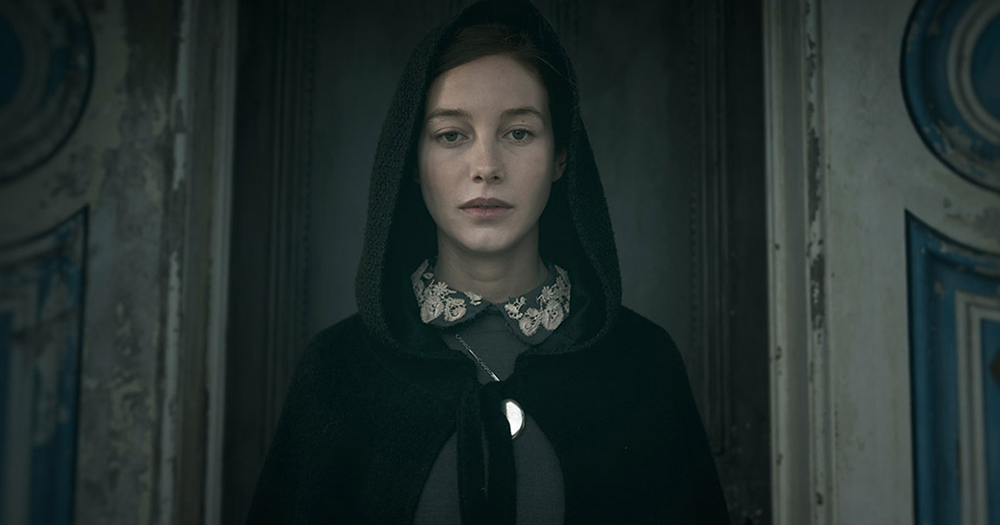“In the gothic, notions of ‘good taste’ and ‘responsibility’ go out the window. Do not enter here seeking to be represented positively. Seek to be represented excitingly.”
The Lodgers, my first feature film as a screenwriter, is my stab (occasionally literally) at a classic gothic melodrama. For me, the gothic has always been a refuge and an outlet. As an obviously gay adolescent in Catholic boys’ school, I was drawn to it for the way in which it created a space for the taboo and the unspeakable. Now, as an adult, I still find myself turning to the gothic as a language of metaphor to talk about things – identity, sexuality, family – that are often too difficult, or too frightening, to talk about in literal terms.
With The Lodgers I wanted to tell a story that provided all the pleasures of the gothic – cursed twins, haunted houses, amputee eroticism, you name it – but that also had a mind and a message of its own. The heroine of the film, Rachel (played by the wonderful Charlotte Vega), is a young person who must choose to live as a prisoner of expectation, or step out into a potentially dangerous world to claim her own identity. I think many of us, as queer people, can identify with that situation – and can understand the dangers inherent in it.
Maybe the gothic gives us a way to express those kinds of choices, as we try to negotiate with pasts that haunt us, while looking to often uncertain futures.
Here are five of my favourite subtly and/or overtly queer gothic films, some of which were influences on The Lodgers. Seek them out, if you dare.
The Bride of Frankenstein (1935)
James Whale was a working class Northern English boy who reinvented himself as a cod-aristocratic sophisticate in Hollywood, where he became synonymous with the stylish horror pictures he made for Universal Studios. Whale’s original Frankenstein (1931) is deservedly a classic, but it is in this sequel that his flagrantly queer vision – replete with perverse humour, desperate poignancy, and enormous arrangements of cut flowers – reaches its apotheosis. I love it so much that I stole a line from it (“we belong dead”) as the title for my 2013 album.
Another choice pick from the Universal canon is Lambert Hillyer’s ravishingly melancholic Dracula’s Daughter (1936), in which the title character scours the fog-bound streets of London for female lovers/victims, and turns to conversion therapy in an effort to rid herself of her desires.
Rebecca (1940)
Viewed from a certain angle, Alfred Hitchcock’s Daphne Du Maurier adaptation is a rather anti-queer piece, in which the lesbian housekeeper, Mrs. Danvers (Judith Anderson) persecutes the new Mrs. De Winter (Joan Fontaine) out of jealousy and thwarted desire. But when one is confronted by a spectacle as fabulous as Mrs. Danvers caressing her dead mistress’s underwear before enticing her successor to jump out a window, what can one do but surrender?
In the gothic, notions of ‘good taste’ and ‘responsibility’ go out the window as well. Do not enter here seeking to be represented positively. Seek to be represented excitingly. The queers are usually the villains – but don’t we all prefer the villains, deep down?
The Fall of the House of Usher (1960)
I fell in love with Roger Corman’s luridly coloured (and remarkably cost-effective) Edgar Allan Poe series as a teenager, and this is the greatest of them all. Vincent Price is at the absolute peak of his singular powers as Roderick Usher, a man tormented by family curses, mysterious ailments, and confused feelings about his own sister. Although Price’s own bisexuality was only disclosed after his death, the queer is writ large in this magnificent performance – a sinister, glorious sissy for the ages.
Full disclosure: Roderick Usher was a major influence on the character of Edward (played by Bill Milner) in The Lodgers.
https://www.youtube.com/watch?v=dXpYKCAEOQc
Your Vice is a Locked Room and Only I Have the Key (1972)
Loosely – and I mean very loosely – based on Poe’s ‘The Black Cat’, Sergio Martino’s film is a heaped serving of murder, deceit and forbidden desire that more than lives up to its splendidly absurd and evocative title. I became aware of this classic Italian giallo quite recently, and it has brought me an inordinate amount of pleasure. I can’t imagine ever getting tired of the scene in which Anita Strindberg’s bisexual anti-heroine casually pushes a man off a cliff without so much as disturbing her pink chiffon headscarf. That’s what the movies are made for.
https://www.youtube.com/watch?v=gMBtjDjzb8c
The Duke of Burgundy (2014)
Peter Strickland’s The Duke of Burgundy appears to be a piece of gothic-tinged erotica taking place in a dream-world populated only by homosexual women. The genius of the film, however, is the way in which it mimics the steamy surface of 1970s Eurotrash exploitation films (such as Your Vice is a Locked Room), while at the same time telling a wise, affecting, and deeply humane story of the ways in which love can make us a hostage to the perceptions and desires of another. It’s an exquisite film, and one of my favourites of recent years.
The Lodgers is released in Irish cinemas today. David Turpin is a screenwriter and musician (as The Late David Turpin). His web-site is www.thelatedavidturpin.com. Read our review of The Lodger here, and watch the trailer below
© 2018 GCN (Gay Community News). All rights reserved.
